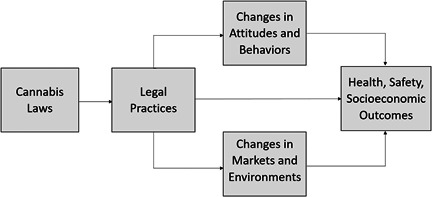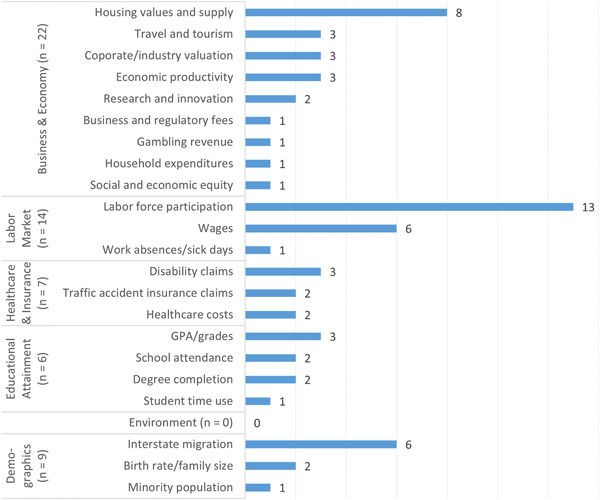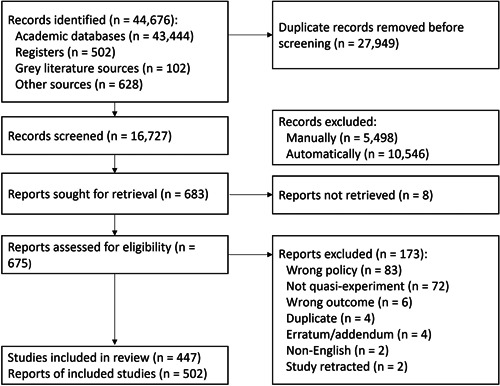Health, safety, and socioeconomic impacts of cannabis liberalization laws: An evidence and gap map
IF 7.1
Q1 SOCIAL SCIENCES, INTERDISCIPLINARY
引用次数: 0
Abstract
Abstract Background Globally, cannabis laws and regulations are rapidly changing. Countries are increasingly permitting access to cannabis under various decriminalization, medicalization, and legalization laws. With strong economic, public health, and social justice incentives driving these domestic cannabis policy reforms, liberalization trends are bound to continue. However, despite a large and growing body of interdisciplinary research addressing the policy‐relevant health, safety, and socioeconomic consequences of cannabis liberalization, there is a lack of robust primary and systematic research that comprehensively investigates the consequences of these reforms. Objectives This evidence and gap map (EGM) summarizes the empirical evidence on cannabis liberalization policies. Primary objectives were to develop a conceptual framework linking cannabis liberalization policies to relevant outcomes, descriptively summarize the empirical evidence, and identify areas of evidence concentration and gaps. Search Methods We comprehensively searched for eligible English‐language empirical studies published across 23 academic databases and 11 gray literature sources through August 2020. Additions to the pool of potentially eligible studies from supplemental sources were made through November 2020. Selection Criteria The conceptual framework for this EGM draws upon a legal epidemiological perspective highlighting the causal effects of law and policy on population‐level outcomes. Eligible interventions include policies that create or expand access to a legal or decriminalized supply of cannabis: comprehensive medical cannabis laws (MCLs), limited medical cannabidiol laws (CBDLs), recreational cannabis laws (RCLs), industrial hemp laws (IHLs), and decriminalization of cultivations laws (DCLs). Eligible outcomes include intermediate responses (i.e., attitudes/behaviors and markets/environments) and longer‐term consequences (health, safety, and socioeconomic outcomes) of these laws. Data Collection and Analysis Both dual screening and dual data extraction were performed with third person deconfliction. Primary studies were appraised using the Maryland Scientific Methods Scale and systematic reviews were assessed using AMSTAR 2. Main Results The EGM includes 447 studies, comprising 438 primary studies and nine systematic reviews. Most research derives from the United States, with little research from other countries. By far, most cannabis liberalization research focuses on the effects of MCLs and RCLs. Studies targeting other laws—including CBDLs, IHLs, and DCLs—are relatively rare. Of the 113 distinct outcomes we documented, cannabis use was the single most frequently investigated. More than half these outcomes were addressed by three or fewer studies, highlighting substantial evidence gaps in the literature. The systematic evidence base is relatively small, comprising just seven completed reviews on cannabis use (3), opioid‐related harms (3), and alcohol‐related outcomes (1). Moreover, we have limited confidence in the reviews, as five were appraised as minimal quality and two as low quality. Authors’ Conclusions More primary and systematic research is needed to better understand the effects of cannabis liberalization laws on longer‐term—and arguably more salient—health, safety, and socioeconomic outcomes. Since most research concerns MCLs and RCLs, there is a critical need for research on the societal impacts of industrial hemp production, medical CBD products, and decriminalized cannabis cultivation. Future research should also prioritize understanding the heterogeneous effects of these laws given differences in specific provisions and implementation across jurisdictions.



大麻自由化法律的健康、安全和社会经济影响:证据和差距图
背景:在全球范围内,大麻法律法规正在迅速变化。各国越来越多地根据各种非刑事化、医疗化和合法化法律允许获得大麻。随着强有力的经济、公共卫生和社会正义激励措施推动这些国内大麻政策改革,自由化趋势势必会继续。然而,尽管有大量且不断增长的跨学科研究涉及大麻自由化的政策相关健康、安全和社会经济后果,但缺乏全面调查这些改革后果的有力的初级和系统研究。目的:本证据和差距图总结了大麻自由化政策的经验证据。主要目标是制定一个将大麻自由化政策与相关成果联系起来的概念框架,描述性地总结经验证据,并确定证据集中和差距的领域。搜索方法:截至2020年8月,我们在23个学术数据库和11个灰色文献来源中全面搜索了符合条件的英语实证研究。截至2020年11月,从补充来源对潜在合格研究进行了补充。选择标准:本EGM的概念框架借鉴了法律流行病学的观点,强调了法律和政策对人口水平结果的因果影响。符合条件的干预措施包括制定或扩大合法或非刑事化大麻供应的政策:全面的医用大麻法、有限的医用大麻二酚法、娱乐性大麻法、工业大麻法和非刑事化种植法。符合条件的结果包括这些法律的中间反应(即态度/行为和市场/环境)和长期后果(健康、安全和社会经济结果)。数据收集和分析:双重筛查和双重数据提取均采用第三人称消除冲突。使用马里兰科学方法量表评估初级研究,使用AMSTAR 2评估系统综述。主要结果:EGM包括447项研究,包括438项初级研究和9项系统综述。大多数研究来自美国,很少有来自其他国家的研究。到目前为止,大多数大麻自由化研究都集中在MCL和RCL的影响上。针对CBDL、IHL和DCL等其他法律的研究相对较少。在我们记录的113种不同结果中,大麻使用是最频繁调查的一种。三项或更少的研究解决了这些结果的一半以上,突出了文献中的大量证据空白。系统的证据基础相对较小,仅包括关于大麻使用(3)、阿片类药物相关危害(3)和酒精相关结果(1)的七项完整审查。此外,我们对这些审查的信心有限,因为有五项审查被评为最低质量,两项被评为低质量。作者的结论:需要进行更多的初步和系统的研究,以更好地了解大麻自由化法律对更长期、更显著的健康、安全和社会经济结果的影响。由于大多数研究涉及MCL和RCL,因此迫切需要研究工业大麻生产、医用CBD产品和非刑事化大麻种植的社会影响。鉴于不同司法管辖区在具体条款和实施方面的差异,未来的研究还应优先了解这些法律的异质性影响。
本文章由计算机程序翻译,如有差异,请以英文原文为准。
求助全文
约1分钟内获得全文
求助全文
来源期刊

Campbell Systematic Reviews
Social Sciences-Social Sciences (all)
CiteScore
5.50
自引率
21.90%
发文量
80
审稿时长
6 weeks
 求助内容:
求助内容: 应助结果提醒方式:
应助结果提醒方式:


